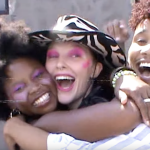Bryan Thompson joined the AIDS United team in January 2019, as a program associate for the Using Evidence-Informed Interventions to Improve the Health Outcomes Among People Living with HIV initiative (E2i). We caught up with Bryan to learn more about his journey to AIDS United, his reflections on National Youth HIV/AIDS Awareness Day (NYHAAD, marked April 10), and what keeps him motivated to do this work.

Bryan ThompsonCourtesy of AIDS United
Tell me a bit about yourself and how you got involved in this work?
I am a DC native who loves his city and his community. I have always wanted to get involved with nonprofit work but never knew exactly how or in what capacity I could best serve. About three years ago, my now fiancé, then best friend, encouraged me to apply for a position with his organization, Us Helping Us. I got the job as a Community Outreach Worker working with young gay black men like myself and discovered how much joy I receive from talking with people about sex, their sexual health, and building community and reducing stigma. That started my journey and passion for the work that I am currently doing in HIV.
You previously worked in direct services supporting young people living with and affected by HIV in DC, so what has it been like to work in grant management at the national level?
Since making my transition from direct service work into grant making/management at AU, I’ve found it to be almost full circle. Best way to describe it, one day I was on one side of monitoring calls, and today I’m on the opposite side. As a result, I can bring a perspective that some agencies don’t get to experience due to their capacity and also work with the CBOs to identify and overcome their barriers while providing an empathetic point of view. I believe I am now in the best position to further my work not just locally but nationally.
What do you want people to know about young people, on National Youth HIV/AIDS Awareness Day?
I want people to remember that they were once a young person. They too had questions about things that sparked their interest. They too are searching and trying to find and understand who they are and their purpose in the world. They too make mistakes and will continue to make them. What we need to do is nurture our young people and be available to guide them when necessary. Most importantly, we must properly educate our young people. Soon they will be in positions that will dictate how our lives will play out. Let us equip them with not only the knowledge, but the courage to make those decisions in the best interest of us all.
To young people, I want them to remember that they may not have as long a résumé as others, but that doesn’t diminish their experiences. Their journeys are just beginning, and they will come across many bumps along the way. Do not stop pushing forward. Sex is something to be celebrated and not kept a secret. Continue to ask those questions that seem to be uncomfortable or “only for adults.” And most importantly, do not stop loving and supporting one another. The power of love is something that we all need in order to get through any hardship.
Why is it important for younger generations to talk about HIV? What are some ways to start the conversation?
It is important for the younger generation to talk about HIV because if they don’t then we won’t see an end to the epidemic. As the years go on, we are learning and improving on the medical technology used to fight the disease. The epidemic doesn’t look the way it did when it began and gratefully so, but because of this, most young people don’t understand the impact that it can and has had on many of our lives, especially other youth.
Also, like the saying goes, if you knew better, you’d do better. People can only know better if they have proper knowledge and conversations around HIV. Also, the more normalized the conversation becomes, we can lessen the stigma associated with HIV.
[Editor’s note: Access tools to stop HIV stigma here!]
How do you stay motivated in this work?
It’s all about hope. I have hope that I will see an end to this epidemic in my life. I have hope that as a community, we will come together and strengthen our efforts to support one another in healthy ways. I have hope that the work I am doing is changing the lives of those that I meet, which will lead to a ripple effect of knowledge being passed from one to another. More importantly, I stay motivated because HIV affects my life. Whether negative or positive, HIV affects us all and I would love for nothing more than to see us all living long, happy, and healthy lives.
Thank you, Bryan!








Comments
Comments